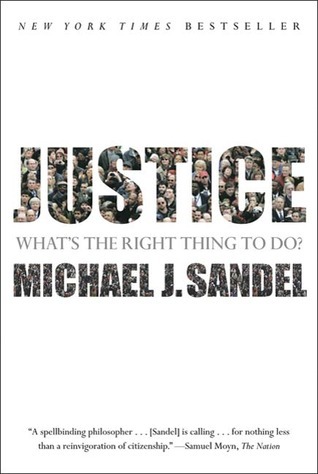More on this book
Community
Kindle Notes & Highlights
Read between
January 12 - January 20, 2019
To ask whether a society is just is to ask how it distributes the things we prize—income and wealth, duties and rights, powers and opportunities, offices and honors.
Faris Alsaleh liked this
The first approach says the morality of an action depends solely on the consequences it brings about; the right thing to do is whatever will produce the best state of affairs, all things considered. The second approach says that consequences are not all we should care about, morally speaking; certain duties and rights should command our respect, for reasons independent of the social consequences.
Faris Alsaleh and 1 other person liked this
“It is better to be a human being dissatisfied than a pig satisfied; better to be Socrates dissatisfied than a fool satisfied. And if the fool, or the pig, are of a different opinion, it is because they only know their own side of the question.”
We are inclined to view the state, with its binding laws and regulations, as the realm of force; and to see the market, with its voluntary exchanges, as the realm of freedom.
What we commonly think of as market freedom or consumer choice is not true freedom, Kant argues, because it simply involves satisfying desires we haven’t chosen in the first place.
The mere fact that the majority, however big, favors a certain law, however intensely, does not make the law just.
Whenever my behavior is biologically determined or socially conditioned, it is not truly free. To act freely, according to Kant, is to act autonomously. And to act autonomously is to act according to a law I give myself—not according to the dictates of nature or social convention.
Sparing someone’s feelings is an admirable end, but it must be pursued in a way that is consistent with the categorical imperative, which requires that we be willing to universalize the principle on which we act.
The mere fact that a group of people in the past agreed to a constitution is not enough to make that constitution just.
But language, a distinctly human capacity, isn’t just for registering pleasure and pain. It’s about declaring what is just and what is unjust, and distinguishing right from wrong.
Our Gross National Product now is over 800 billion dollars a year. But that Gross National Product counts air pollution and cigarette advertising, and ambulances to clear our highways of carnage. It counts special locks for our doors and the jails for the people who break them. It counts the destruction of the redwood and the loss of our natural wonder in chaotic sprawl. It counts napalm and counts nuclear warheads and armored cars for the police to fight the riots in our cities. It counts . . . the television programs which glorify violence in order to sell toys to our children. Yet the Gross
...more


